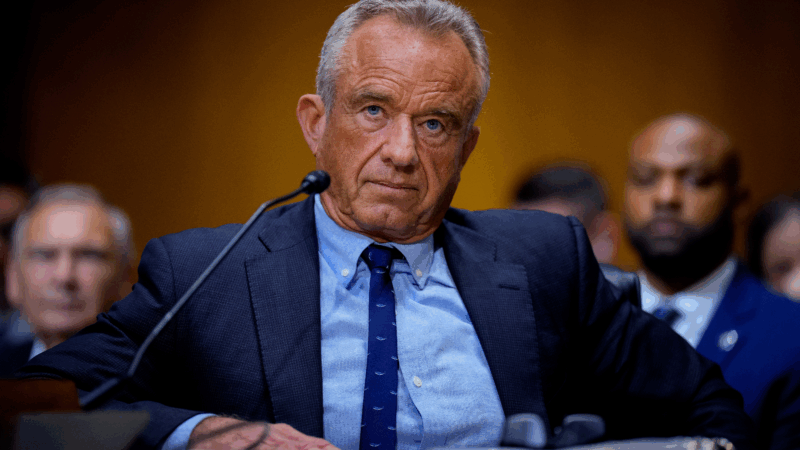RFK Jr. ‘rejects’ a U.N. declaration on non-communicable diseases
Alison Cox was in the room on Thursday when U.S. Health and Human Services Secretary Robert F. Kennedy Jr. took the mic — and proceeded to throw a monkeywrench into the path of a highly-anticipated United Nations political declaration on non-communicable diseases.
RFK Jr. said the U.S. would “reject it.”
“It’s a massive disappointment to hear a government step away,” says Cox, the policy director for NCD Alliance, a global advocacy group.
The declaration that was being considered at the U.N. General Assembly in New York is the culmination of years of work – and five months of formal negotiations – by governments, health experts and members of civil society. It lays out a roadmap for preventing and controlling non-communicable diseases — like cardiovascular diseases, diabetes and cancer — and promoting mental health.
RFK Jr. started his remarks by saying how much he cares about addressing these chronic diseases. He then proceeded to object to the U.N. declaration, saying: “The United States will walk away from the declaration, but we will never walk away from the world or our commitment to end chronic disease.”
“It exceeds the U.N.’s proper role while ignoring the most pressing health issues,” he added, although he did not elaborate on what issues he had in mind. HHS did not respond to questions NPR sent requesting an explanation.
He did say that the Trump administration has concerns about promoting “radical gender ideology” and abortion. However, the U.N. declaration does not address reproductive rights or issues of gender identity.
Instead, the focus is on the 43 million people who die globally each year from non-communicable diseases, including strokes and lung disease. Of that number 18 million people die before their 70th birthday and more than 80% of those premature deaths happen in low- and middle-income countries.
The document lays out targets to be achieved by 2030, including reducing the number of tobacco users by 150 million, enabling 150 million more people to control their hypertension and increasing the number of people with access to mental health care.
Some countries and advocates have expressed concerns about the text, such as the fact that the document does not discuss sugary beverages despite the role they play in rising rates of childhood obesity.
However, there was broad support for moving the declaration forward. In a statement on Friday, the World Health Organization (WHO) said “world leaders have expressed overwhelming support for the text.”
RFK Jr.’s rejection of the political declaration is part of a broader picture in which the Trump administration has been critical of WHO as well as other U.N. agencies. On inauguration night, the U.S. started the process of withdrawing the U.S. from the international body and Trump soon prevented some U.S. health officials from communicating with WHO officials. RFK Jr. has also taken an active role in global health decisions, including cutting off funding for Gavi, the Vaccine Alliance, calling out their “safety issues” based on a questionable study.
However, the U.S. rejection of the U.N. declaration is not a death knell.
U.N.General Assembly President Annalena Baerbock said the document will be considered for final approval by member states in the General Assembly in October. Cox expects it will win wide support there.
“In the end, the rest of the governments will move forward and act and take their commitment forward,” she says. “There’s a feeling of resolve not to let this stand in the way of the urgent action needed.”
Bill making the Public Service Commission an appointed board is dead for the session
Usually when discussing legislative action, the focus is on what's moving forward. But plenty of bills in a legislature stall or even die. Leaders in the Alabama legislature say a bill involving the Public Service Commission is dead for the session. We get details on that from Todd Stacy, host of Capitol Journal on Alabama Public Television.
Baz Luhrmann will make you fall in love with Elvis Presley
The new movie is made up of footage originally shot in the early 1970s, which Luhrmann found in storage in a Kansas salt mine.
My doctor keeps focusing on my weight. What other health metrics matter more?
Our Real Talk with a Doc columnist explains how to push back if your doctor's obsessed with weight loss. And what other health metrics matter more instead.
Forget the State of the Union. What’s the state of your quiz score?
What's the state of your union, quiz-wise? Find out!
As the U.S. celebrates its 250th birthday, many Latinos question whether they belong
Many U.S.-born Latinos feel afraid and anxious amid the political rhetoric. Still, others wouldn't miss celebrating their country
A team of midlife cheerleaders in Ukraine refuses to let war defeat them
Ukrainian women in their 50s and 60s say they've embraced cheerleading as a way to cope with the extreme stress and anxiety of four years of Russia's full-scale invasion.








